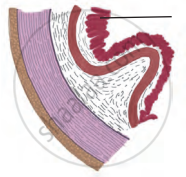Advertisements
Advertisements
Question
What is digestion? Why do only animals require a digestive system?
Solution
Digestion is the process of breaking down complex food materials into simpler substances by the action of enzymes.
Need for a digestive system:
(i) Large complex molecules like carbohydrates, proteins and lipids need to be broken down to simpler molecules. These simpler molecules can then be absorbed and utilized by the body.
(ii) The breaking down of complex food molecules into their simpler form is possible only through the process of digestion.
(iii) During digestion, large complex macromolecules present in food are converted into small simpler molecules, which can be simplified in different compartments of digestive system only.
APPEARS IN
RELATED QUESTIONS
The tongue helps in mixing food with saliva.
The partially digested food coming from the stomach of a person enters a long and narrow organ A in his body. The organ A receives the secretion of two glands : liver and pancreas. Liver secretes a greenish-yellow liquid B which is normally stored in the organ C. Pancreas secretes pancreatic juice which contains three digestive enzymes D, E and F. The intestinal juice completes the process of digestion of food. The inner wall of organ A has millions of tiny finger-like projections G which help in the rapid absorption of digested food into blood stream. The undigested part of food then passes into wider tube H which absorbs most of the water from undigested food. The last part of tube H called I stores this undigested food (or waste) for some time. The undigested food is then passed out though opening J as faeces in the process known as K.
(a) Name the organ A.
(b) Name (i) liquid B, and (ii) organ C.
(c) What are the digestive enzymes D, E and F?
(d) Name the projections G present on the inner wall of organ A.
(e) Name (i) tube H (ii) part I (iii) opening J, and (iv) process K.
Draw a labelled diagram to show the internal structure of a mammalian tooth with two roots.
Give reasons for the following:
All teeth in the mouth are not alike.
Name different steps involved in animal nutrition. Explain.
Who is telling a lie?
Lung: I play an important role in excretion.
Observe the diagram. This is the histological structure of the stomach. Identify and comment on the significance of the layer marked by an arrow.

Circle the odd one.
What is the significance of the emulsification of fats?
Name the correct substrates for the following enzymes
- Trypsin
- Amylase
- Pepsin
- Lipase
